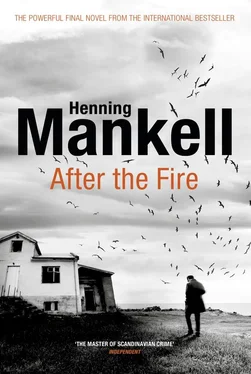We followed a winding street lined with old buildings, with crumbling plaster facades and layer upon layer of graffiti, which somehow managed to intensify the greyness rather than brightening the place up. A woman in a full hijab came towards us carrying a screaming child. A group of men sat smoking in a doorway. When I peered into the darkness I saw an elderly man feeding another man with a soup spoon, his movements slow and measured.
Louise was walking quickly. She seemed to be in a hurry to get home, but I thought she was also running away from the time she had spent in that subterranean cell.
She turned into a cul-de-sac and stopped at the last building, which was next to a high wall. It was a four-storey apartment block, just as dilapidated as everything else I had seen on our way from the Metro.
‘This is my island,’ she said, pushing open the door.
The stairwell was filled with the aroma of exotic spices. From one apartment I could hear music that mostly consisted of the sounds of a monotone flute, beautiful and melancholy. We went all the way up to the top floor; it annoyed me that I was out of breath. Louise waited for me on the landing.
‘This is where I live,’ she said. ‘But I don’t live alone.’
She had a bunch of keys in her hand and turned towards the door.
‘Hang on a minute,’ I said. ‘I need to know what to expect.’
‘My apartment.’
‘You just said you don’t live alone?’
‘I live with my partner.’
‘Your partner?’
She placed a hand on her belly. ‘My baby has a father.’
‘I’ve asked you about him, and you wouldn’t tell me anything. And now all of a sudden I’m going to meet him?’
‘Yes.’
‘Does he have a name?’
‘Yes.’
‘Any chance you could tell me what it is? What he does? How long you’ve been together?’
‘Do we have to have this discussion on the landing? His name is Ahmed.’
I waited for her to go on, but instead she unlocked the door. I followed her into a dark hallway; it reminded me of the apartment in which I had lived on Rue de Cadix.
‘Ahmed will be asleep,’ she said, pointing at a closed door. ‘He works nights as a security guard. He’s from Algiers.’ She led me into the kitchen, which was small and cramped. I tried to picture Ahmed, to whom I would be related when the child was born, but nothing came into my head.
The kitchen was freshly painted and smelled of turpentine. The cooker and the fridge were old; the table and chairs could easily have been retrieved from a skip. I realised that Louise and this man called Ahmed were poor. Obviously life as a security guard and a pickpocket wasn’t very lucrative.
Louise made coffee; I sat down on the chair nearest the window. The adjacent block was just a few metres away, and a radio or some kind of stereo was playing loud music in the distance.
‘I have to know,’ I said. ‘Do you really make your living as a pickpocket? You’re clearly not very good at it — you got caught.’
‘You know what I used to be like,’ she said. ‘When we first met.’
I remembered only too well. Louise had turned up in a picture in the newspaper, which Jansson, needless to say, had got hold of. Louise had stripped naked in front of a group of international politicians to protest about something or other — I no longer recall what it was. I had realised then that my daughter was a rebel, as unlike me as it was possible to be. Where I had always been frightened and insecure and put on a front, pretending to be brave, she had burned with a passion for her beliefs and had thought it possible to bring about change through a lone protest.
I wondered what had happened to all the anger that had been directed at politicians and a world she couldn’t bear?
‘I have to make a living somehow.’
‘That’s why you became a pickpocket?’
‘I’ve never stolen from anyone who couldn’t afford to lose what I took.’
‘How can you possibly know that?’
She shrugged.
‘Does Ahmed know about this?’
‘Yes.’
‘And is he a pickpocket too?’
She hesitated before she answered.
‘There’s a part of my life you don’t know about,’ she said eventually. ‘I’ll tell you. The year after Harriet died, I hitched all the way to Barcelona. On a few occasions I had to fight off men who thought I’d got into their cars to do them a service; I always had a steel tail-comb at the ready. In the Pyrenees I once had to stab a guy in the cheek. I was afraid he might die; the blood was spurting all over the place.
‘Anyway, I managed to get out of the car before anything happened. I was going to Barcelona to join a demonstration against Spain’s abortion laws. I had a friend, Carmen Rius, who lived in a part of the city called Poble Sec; the people there are not exactly rolling in money. We took part in the demo, but then Carmen asked me to go with her to Las Ramblas, an area frequented by tourists. She didn’t tell me what we were going to do, she just said I should stick close to her and take anything she passed to me. Her English wasn’t very good, and my Spanish was even worse, but I went along with her all the same. I watched as she approached a Japanese tourist, a guiri as she put it. The woman had a rucksack on her back, and one of the pockets was open. Carmen removed a wallet so fast that I hardly saw her do it. She gave it to me and hissed at me to hide it. I slipped it into my handbag and Carmen disappeared. The Japanese tourist hadn’t noticed a thing. I realised then that Carmen was a carterista , a pickpocket. I was astonished at how easy it had been.
‘When I asked her how it felt to be a thief, she insisted that no one who lost their wallet or phone would go under. She never went for the poor, only tourists who could afford to travel, and therefore could also afford to lose a few possessions. I allowed myself to be persuaded, and she taught me how to do it. After a few weeks Carmen let me have a go. An Asian tourist with her money in her back pocket was my first victim. It went well, and Carmen said I was now a fully-fledged carterista . Strangely enough I wasn’t nervous at all. I stayed for six months and became part of a group of four women working together.’
She paused and waited for my reaction.
‘Now you know how it started.’
I was sure that she was telling the truth. She really did want me to know.
‘Ahmed,’ I said. ‘You said he’s from Algiers, but you’re telling me about Barcelona?’
‘I didn’t meet him there. Carmen was arrested, and I moved to Paris. I met him through friends of friends, and we were a couple.’
‘Did you tell him you were a pickpocket?’
‘Not right away. Not until I was sure we were really together.’
‘And what did he say?’
‘Not much. Nothing. But he’s not a pickpocket, even though he does have fantastic fingers.’
‘But he lets you do it? What kind of a man is he?’
Louise leaned across the table and grabbed my hand.
‘A man I love. The only man I’ve ever loved before, although in a different way, was Giaconelli the shoemaker. When I met Ahmed, I understood what love could be.’
I gave a start; there was a man standing in the doorway. I had no idea how long he’d been there. He was unshaven with cropped dark hair and was wearing a white vest and striped pyjama trousers. His bare feet were extremely hairy.
‘This is Fredrik, my father,’ Louise said in English. ‘And this is Ahmed, my partner.’
I stood up and shook his hand. He was considerably younger than my daughter, probably no more than thirty years old. He smiled at me, but his expression was watchful.
He pulled out a stool and sat down at the table. He looked as if he was expecting me to say something. Everything to do with my daughter was completely incomprehensible as far as I was concerned. I would never be able to work out how she had become what she had become.
Читать дальше












